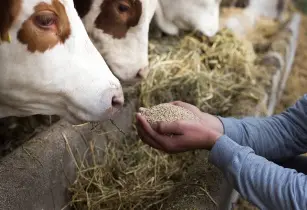Kenyan entrpreneur develops molasss-based supplement to prevent essential dairy feed nutrients from being excreted out in cow dung
According to a report by IPS News, Nakuru-based entrepreneurHenry Ambwere, developed an organic molasses-based supplement comprising of naturally occuring pro-life bacteria to pro-digest the animal feeds, thereby enabling smooth utilisation of all nutrients, while also decreasing the amount of cow dung produced by the animal.
Using these microbes also increases the animal's body mass and milk production, without the need to increase feed quantity. Moreover, the microbial action does not decrease milk quality. The product which is sold under the name 'MolaPlus Livestock Microbes,' is one of the most sought-after products, especially by smallholder farmers.
In the report, Abwere also mentioned that using this product on extremely dry maize stovers and overgrown Napier grass, turns the fodder into high-quality feeds, thus significantly enhancing livestock production. The process involves inoculating the dairy meal with the microbes, and allowing it to a day before feeding it to the animals. The fermentation process enables the microbes to multiply in trillions in a matter of hours.
Although not much research has been carried out explaining the solid-state fermentation of complete feed, a recent study by scientists from Guizhou Normal University, Guiyang, and Shanxi Agricultural University, Jinzhong in China have confirmed the importance of microbial fermented feeds in the feed industry. Fermented complete feeds were found to effectively reduce the relative abundance of presumably pathogenic bacteria of phylum Proteobacteria and genus Escherichia-Shigella and enhance the relative abundances of likely beneficial bacteria of phylum Firmicutes and genus Clostridium.
In addition to this, microbe inoculated feeds were found to contain increased levels of suppressed alfatoxin, compared to dry feeds from the same feed stock.





